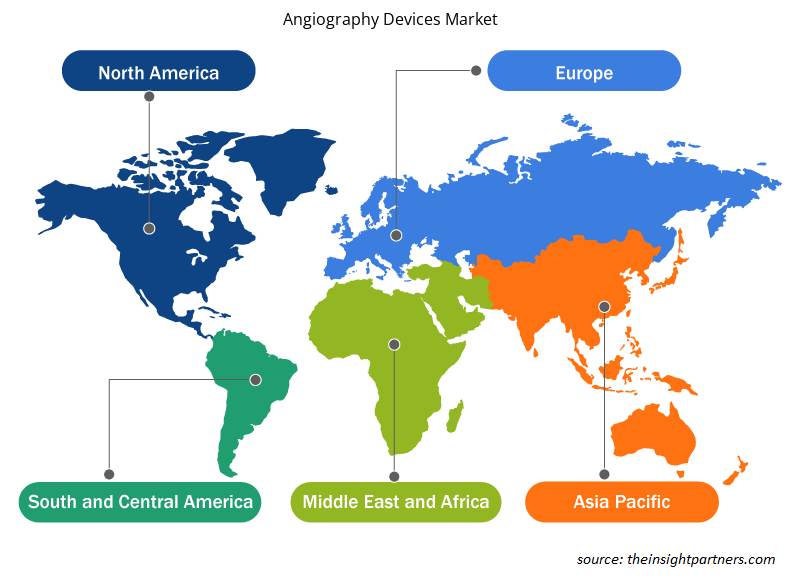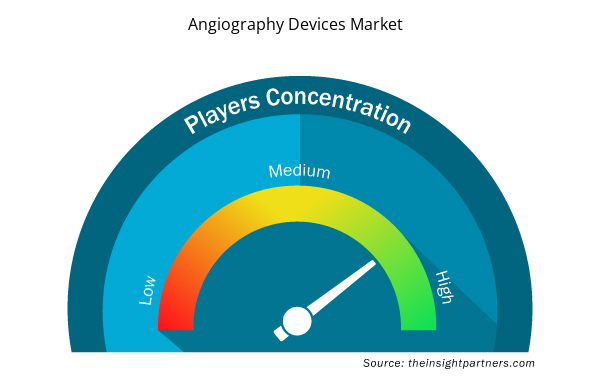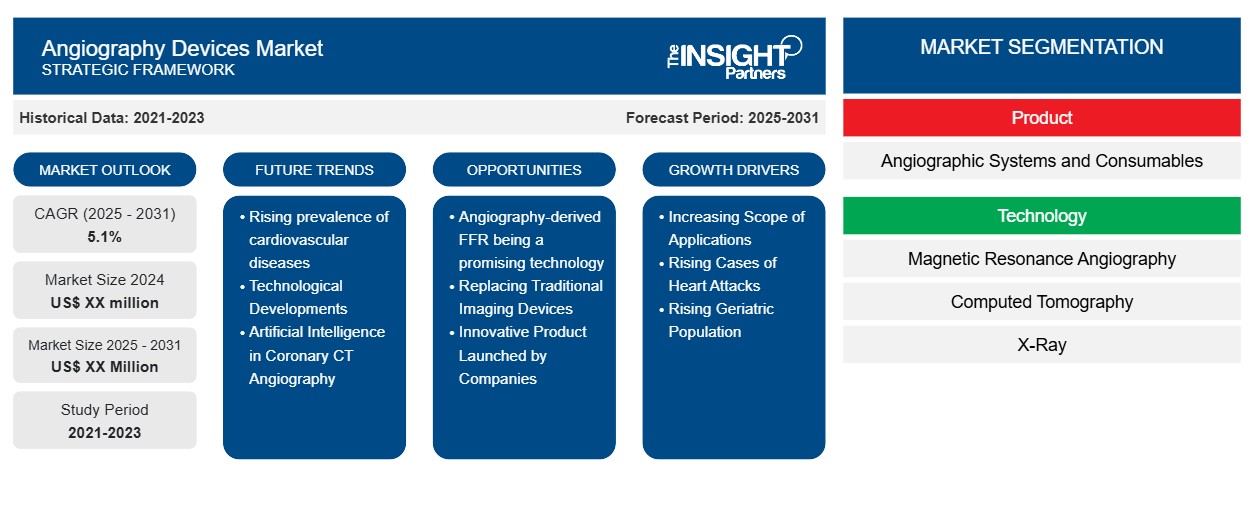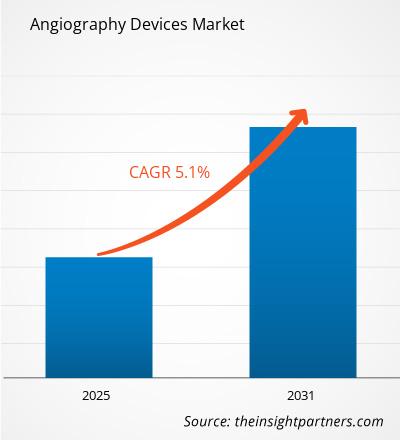Der Markt für Angiographiegeräte soll im Zeitraum von 2024 bis 2031 eine durchschnittliche jährliche Wachstumsrate (CAGR) von 5,1 % verzeichnen, wobei die Marktgröße von XX Millionen US-Dollar im Jahr 2024 auf XX Millionen US-Dollar im Jahr 2031 anwachsen soll.
Der Bericht ist segmentiert nach Angiographiegeräte-Markt nach Produkt (Angiographiesysteme und Verbrauchsmaterialien), Technologie [Magnetresonanzangiographie (MRA), Computertomographie (CT), Röntgen und andere Technologien)], Verfahren (Koronarangiographie, Mikroangiographie, nicht-koronare Angiographie und andere), Anwendung (Diagnose und Therapie), Indikation (angeborene Herzkrankheit, kongestive Herzinsuffizienz, Herzklappenerkrankung, bekannte und vermutete Koronararterienerkrankung (KHK) und andere), Endnutzer (Krankenhäuser, Diagnosezentren, ambulante chirurgische Zentren und akademische Forschungslabore) und Geografie (Nordamerika, Europa, Asien-Pazifik, Naher Osten und Afrika sowie Süd- und Mittelamerika). Die globale Analyse ist weiter auf regionaler Ebene und nach wichtigen Ländern aufgeschlüsselt. Der Bericht bietet den Wert in USD für die oben genannte Analyse und Segmente.
Zweck des Berichts
Der Bericht „Markt für Angiographiegeräte“ von The Insight Partners soll die aktuelle Situation und das zukünftige Wachstum sowie die wichtigsten treibenden Faktoren, Herausforderungen und Chancen beschreiben. Dies wird verschiedenen Geschäftspartnern Einblicke geben, wie zum Beispiel:
- Technologieanbieter/-hersteller: Um die sich entwickelnde Marktdynamik zu verstehen und die potenziellen Wachstumschancen zu kennen, damit sie fundierte strategische Entscheidungen treffen können.
- Investoren: Durchführung einer umfassenden Trendanalyse hinsichtlich der Marktwachstumsrate, der finanziellen Marktprognosen und der Chancen entlang der Wertschöpfungskette.
- Regulierungsbehörden: Sie regulieren Richtlinien und polizeiliche Maßnahmen auf dem Markt mit dem Ziel, Missbrauch zu minimieren, das Vertrauen der Anleger zu bewahren und die Integrität und Stabilität des Marktes aufrechtzuerhalten.
Angiographiegeräte Marktsegmentierung
Produkt
- Angiographische Systeme und Verbrauchsmaterialien
Technologie
- Magnetresonanz-Angiographie
- Computertomographie
- Röntgen
- Andere Technologien
Verfahren
- Koronarangiographie
- Mikroangiographie
- Nichtkoronare Angiographie
- Sonstiges
Anwendung
- Diagnostik
- Therapeutisch
Anzeige
- Angeborene Herzkrankheit
- Kongestive Herzinsuffizienz
- Herzklappenerkrankung
- Bekannte und vermutete koronare Herzkrankheit
Passen Sie diesen Bericht Ihren Anforderungen an
Sie erhalten kostenlos individuelle Anpassungen an jedem Bericht, einschließlich Teilen dieses Berichts oder einer Analyse auf Länderebene, eines Excel-Datenpakets sowie tolle Angebote und Rabatte für Start-ups und Universitäten.
- Holen Sie sich die wichtigsten Markttrends aus diesem Bericht.Dieses KOSTENLOSE Beispiel umfasst eine Datenanalyse von Markttrends bis hin zu Schätzungen und Prognosen.
Wachstumstreiber auf dem Markt für Angiographiegeräte
- Zunehmender Anwendungsbereich: Angiographiegeräte werden verwendet, um den Gesundheitszustand von Blutgefäßen und den Blutfluss durch sie zu überprüfen. Sie können bei der Diagnose oder Untersuchung verschiedener Probleme der Blutgefäße helfen, darunter: Arteriosklerose – Verengung der Arterien. Sie helfen bei der Durchführung komplexer und heikler minimalinvasiver chirurgischer Eingriffe.
- Steigende Zahl von Herzinfarkten: Die zunehmende Zahl von Herzinfarkten dürfte das Marktwachstum antreiben. Laut den Centers for Disease Control and Prevention (CDC) erleidet etwa alle 40 Sekunden ein Amerikaner einen Herzinfarkt. Jedes Jahr erleiden 805.000 Amerikaner einen Herzinfarkt, 605.000 davon zum ersten Mal. Etwa 12 % der Menschen, die einen Herzinfarkt erleiden, sterben daran.
- Steigende Zahl geriatrischer Menschen: Die Bevölkerung im Alter von 60 Jahren und älter wird im Jahr 2020 auf 1 Milliarde geschätzt. Bis 2050 wird sich die Weltbevölkerung der über 60-Jährigen verdoppeln (2,1 Milliarden). Die Zahl der über 80-Jährigen wird sich zwischen 2020 und 2050 voraussichtlich verdreifachen und 426 Millionen erreichen.
Zukünftige Trends auf dem Markt für Angiographiegeräte
- Steigende Prävalenz von Herz-Kreislauf-Erkrankungen: Die jährliche Zahl der Todesfälle durch Herz-Kreislauf-Erkrankungen (CVD) in Indien ist von 2,26 Millionen (1990) auf 4,77 Millionen im Jahr 2020 gestiegen. Die Prävalenzraten koronarer Herzkrankheiten in Indien wurden in den letzten Jahrzehnten geschätzt und lagen im Jahr 2023 in der ländlichen Bevölkerung zwischen 1,6 % und 7,4 % und in der städtischen Bevölkerung zwischen 1 % und 13,2 %.
- Technologische Entwicklungen: Die Computertomographie (CT)-Angiographie ist eine innovative Technologie und wird als Alternative zu Stresstests eingesetzt. Die CT-Koronarangiographie ist ein nicht-invasiver Diagnosetest, mit dem das Vorhandensein, die Menge und der Schweregrad von atherosklerotischen Plaques in den Herzarterien bestimmt werden können. Zur grundlegenden Ausrüstung, die für eine konventionelle Angiographie benötigt wird, gehören: Kathetersatz und Führungsdrähte.
- Künstliche Intelligenz in der Koronar-CT-Angiographie: Die Koronar-Herzkrankheit (KHK) ist die häufigste Todesursache weltweit. Früherkennung und Behandlung der KHK sind entscheidend. Derzeit ist die Koronar-CT-Angiographie (CCTA) die bevorzugte Methode für das Screening und die Diagnose von KHK, kann jedoch die klinischen Anforderungen in Bezug auf Untersuchungsqualität und Genauigkeit der Befundung sowie Genauigkeit der Prognoseanalyse nicht erfüllen. In den letzten Jahren hat sich die künstliche Intelligenz (KI) im medizinischen Bereich rasant entwickelt; sie spielte eine Schlüsselrolle bei der Hilfsdiagnose, der Analyse von Krankheitsmechanismen und der Prognosebewertung, einschließlich einer Reihe von Studien im Zusammenhang mit KHK.
Marktchancen für Angiographiegeräte
- Angiographiebasierte FFR ist eine vielversprechende Technologie: Angiographiebasierte FFR hat sich als vielversprechende Technologie im Bereich der interventionellen Kardiologie erwiesen. Durch Fortschritte bei Softwarealgorithmen und Bildverarbeitungstechniken konnten die Genauigkeit und Reproduzierbarkeit von FFR-Messungen aus angiographischen Bildern deutlich verbessert werden.
- Ersetzung herkömmlicher Bildgebungsgeräte: Die Angiographie bietet viele Vorteile, da sie dynamische Echtzeitbilder mit herkömmlichen Bildgebungsgeräten wie Röntgenstrahlen oder Computertomographie (CT) ermöglicht und zudem therapeutische Optionen zum Zeitpunkt der Erstdiagnose bietet. Fortschritte in der Bildgebungstechnologie in den letzten drei Jahrzehnten haben den Anwendungsbereich der Angiographie um nichtinvasive Techniken mit CT- und Magnetresonanztomographie-Technologien erweitert.
- Innovative Produkte von Unternehmen auf den Markt gebracht: Im April 2022 begann die Shimadzu Corporation mit dem weltweiten Verkauf ihres Flaggschiff-Angiographiesystems Trinias. Das neue Trinias-System nutzt KI-Deep-Learning-Technologie, um die Sichtbarkeit medizinischer Geräte zu verbessern und gleichzeitig eine um 40 % oder mehr geringere Röntgendosis als frühere Modelle zu verwenden. Diese Implementierung von KI in die Bildverarbeitungs-Engine eines Angiographiesystems war ein revolutionärer Meilenstein für das Unternehmen.
Regionale Einblicke in den Markt für Angiographiegeräte
Die regionalen Trends und Faktoren, die den Markt für Angiographiegeräte im Prognosezeitraum beeinflussen, wurden von den Analysten von Insight Partners ausführlich erläutert. In diesem Abschnitt werden auch die Marktsegmente und die Geografie für Angiographiegeräte in Nordamerika, Europa, im asiatisch-pazifischen Raum, im Nahen Osten und Afrika sowie in Süd- und Mittelamerika erörtert.

- Erhalten Sie regionale Daten zum Markt für Angiographiegeräte
Umfang des Marktberichts zu Angiographiegeräten
| Berichtsattribut | Details |
|---|---|
| Marktgröße im Jahr 2024 | XX Millionen US-Dollar |
| Marktgröße bis 2031 | XX Millionen US-Dollar |
| Globale CAGR (2025 - 2031) | 5,1 % |
| Historische Daten | 2021-2023 |
| Prognosezeitraum | 2025–2031 |
| Abgedeckte Segmente | Nach Produkt
|
| Abgedeckte Regionen und Länder | Nordamerika
|
| Marktführer und wichtige Unternehmensprofile |
|
Dichte der Marktteilnehmer für Angiographiegeräte: Auswirkungen auf die Geschäftsdynamik verstehen
Der Markt für Angiographiegeräte wächst rasant, angetrieben durch die steigende Nachfrage der Endnutzer aufgrund von Faktoren wie sich entwickelnden Verbraucherpräferenzen, technologischen Fortschritten und einem größeren Bewusstsein für die Vorteile des Produkts. Mit steigender Nachfrage erweitern Unternehmen ihr Angebot, entwickeln Innovationen, um die Bedürfnisse der Verbraucher zu erfüllen, und nutzen neue Trends, was das Marktwachstum weiter ankurbelt.
Die Marktteilnehmerdichte bezieht sich auf die Verteilung der Firmen oder Unternehmen, die in einem bestimmten Markt oder einer bestimmten Branche tätig sind. Sie gibt an, wie viele Wettbewerber (Marktteilnehmer) in einem bestimmten Marktraum im Verhältnis zu seiner Größe oder seinem gesamten Marktwert präsent sind.
Die wichtigsten auf dem Markt für Angiographiegeräte tätigen Unternehmen sind:
- Siemens AG
- Kardinal Health Inc.
- Koninklijke Philips NV
- Canon Medical Systems Corporation
- Allgemeines Elektrounternehmen
Haftungsausschluss : Die oben aufgeführten Unternehmen sind nicht in einer bestimmten Reihenfolge aufgeführt.

- Überblick über die wichtigsten Akteure auf dem Markt für Angiographiegeräte
Wichtige Verkaufsargumente
- Umfassende Abdeckung: Der Bericht deckt die Analyse der Produkte, Dienste, Typen und Endbenutzer des Marktes für Angiographiegeräte umfassend ab und bietet einen ganzheitlichen Überblick.
- Expertenanalyse: Der Bericht basiert auf dem umfassenden Verständnis von Branchenexperten und Analysten.
- Aktuelle Informationen: Der Bericht stellt durch die Abdeckung aktueller Informationen und Datentrends Geschäftsrelevanz sicher.
- Anpassungsoptionen: Dieser Bericht kann angepasst werden, um spezifische Kundenanforderungen zu erfüllen und die Geschäftsstrategien optimal anzupassen.
Der Forschungsbericht zum Markt für Angiographiegeräte kann daher dabei helfen, die Branchensituation und Wachstumsaussichten zu entschlüsseln und zu verstehen. Obwohl es einige berechtigte Bedenken geben kann, überwiegen die allgemeinen Vorteile dieses Berichts tendenziell die Nachteile.
- Historische Analyse (2 Jahre), Basisjahr, Prognose (7 Jahre) mit CAGR
- PEST- und SWOT-Analyse
- Marktgröße Wert/Volumen – Global, Regional, Land
- Branche und Wettbewerbsumfeld
- Excel-Datensatz


- Oxy-fuel Combustion Technology Market
- Hydrocephalus Shunts Market
- Hand Sanitizer Market
- Nuclear Waste Management System Market
- Small Satellite Market
- Neurovascular Devices Market
- Emergency Department Information System (EDIS) Market
- Ceramic Injection Molding Market
- Aerosol Paints Market
- Personality Assessment Solution Market

Report Coverage
Revenue forecast, Company Analysis, Industry landscape, Growth factors, and Trends

Segment Covered
This text is related
to segments covered.

Regional Scope
North America, Europe, Asia Pacific, Middle East & Africa, South & Central America

Country Scope
This text is related
to country scope.
Häufig gestellte Fragen
Technological Advancements and implementation of AI in angiography devices
Asia Pacific region is expected to witness the highest growth during the forecast period
Rising cases of coronary diseases in North America region
Radiation exposure risk is one of the key factors restraining the overall revenue growth
Europe region is expected to witness a high growth rate in terms of CAGR after Asia Pacific region during the forecast period
The Angiography Devices Market is estimated to witness a CAGR of 5.1% from 2023 to 2031
Trends and growth analysis reports related to Life Sciences : READ MORE..
The List of Companies
1. Siemens AG
2. Cardinal Health Inc.
3. Koninklijke Philips NV
4. Canon Medical Systems Corporation
5. GENERAL ELECTRIC COMPANY
6. Shimadzu Corporation
7. Boston Scientific Corporation
8. B. BRAUN MELSUNGEN AG
9. Abbott Labs
10. Medtronic Plc
11. GE Healthcare
12. Covidien Plc
13. Cordis Corporation
14. Royal Philips Electronics
15. St. Jude Medical Inc.
16. Toshiba Medical Systems Co
17. AngioDynamics Inc.
18. Terumo Corporation.
19. Hologic, Inc.
20. Carestream Health
The Insight Partners performs research in 4 major stages: Data Collection & Secondary Research, Primary Research, Data Analysis and Data Triangulation & Final Review.
- Data Collection and Secondary Research:
As a market research and consulting firm operating from a decade, we have published and advised several client across the globe. First step for any study will start with an assessment of currently available data and insights from existing reports. Further, historical and current market information is collected from Investor Presentations, Annual Reports, SEC Filings, etc., and other information related to company’s performance and market positioning are gathered from Paid Databases (Factiva, Hoovers, and Reuters) and various other publications available in public domain.
Several associations trade associates, technical forums, institutes, societies and organization are accessed to gain technical as well as market related insights through their publications such as research papers, blogs and press releases related to the studies are referred to get cues about the market. Further, white papers, journals, magazines, and other news articles published in last 3 years are scrutinized and analyzed to understand the current market trends.
- Primary Research:
The primarily interview analysis comprise of data obtained from industry participants interview and answers to survey questions gathered by in-house primary team.
For primary research, interviews are conducted with industry experts/CEOs/Marketing Managers/VPs/Subject Matter Experts from both demand and supply side to get a 360-degree view of the market. The primary team conducts several interviews based on the complexity of the markets to understand the various market trends and dynamics which makes research more credible and precise.
A typical research interview fulfils the following functions:
- Provides first-hand information on the market size, market trends, growth trends, competitive landscape, and outlook
- Validates and strengthens in-house secondary research findings
- Develops the analysis team’s expertise and market understanding
Primary research involves email interactions and telephone interviews for each market, category, segment, and sub-segment across geographies. The participants who typically take part in such a process include, but are not limited to:
- Industry participants: VPs, business development managers, market intelligence managers and national sales managers
- Outside experts: Valuation experts, research analysts and key opinion leaders specializing in the electronics and semiconductor industry.
Below is the breakup of our primary respondents by company, designation, and region:

Once we receive the confirmation from primary research sources or primary respondents, we finalize the base year market estimation and forecast the data as per the macroeconomic and microeconomic factors assessed during data collection.
- Data Analysis:
Once data is validated through both secondary as well as primary respondents, we finalize the market estimations by hypothesis formulation and factor analysis at regional and country level.
- Macro-Economic Factor Analysis:
We analyse macroeconomic indicators such the gross domestic product (GDP), increase in the demand for goods and services across industries, technological advancement, regional economic growth, governmental policies, the influence of COVID-19, PEST analysis, and other aspects. This analysis aids in setting benchmarks for various nations/regions and approximating market splits. Additionally, the general trend of the aforementioned components aid in determining the market's development possibilities.
- Country Level Data:
Various factors that are especially aligned to the country are taken into account to determine the market size for a certain area and country, including the presence of vendors, such as headquarters and offices, the country's GDP, demand patterns, and industry growth. To comprehend the market dynamics for the nation, a number of growth variables, inhibitors, application areas, and current market trends are researched. The aforementioned elements aid in determining the country's overall market's growth potential.
- Company Profile:
The “Table of Contents” is formulated by listing and analyzing more than 25 - 30 companies operating in the market ecosystem across geographies. However, we profile only 10 companies as a standard practice in our syndicate reports. These 10 companies comprise leading, emerging, and regional players. Nonetheless, our analysis is not restricted to the 10 listed companies, we also analyze other companies present in the market to develop a holistic view and understand the prevailing trends. The “Company Profiles” section in the report covers key facts, business description, products & services, financial information, SWOT analysis, and key developments. The financial information presented is extracted from the annual reports and official documents of the publicly listed companies. Upon collecting the information for the sections of respective companies, we verify them via various primary sources and then compile the data in respective company profiles. The company level information helps us in deriving the base number as well as in forecasting the market size.
- Developing Base Number:
Aggregation of sales statistics (2020-2022) and macro-economic factor, and other secondary and primary research insights are utilized to arrive at base number and related market shares for 2022. The data gaps are identified in this step and relevant market data is analyzed, collected from paid primary interviews or databases. On finalizing the base year market size, forecasts are developed on the basis of macro-economic, industry and market growth factors and company level analysis.
- Data Triangulation and Final Review:
The market findings and base year market size calculations are validated from supply as well as demand side. Demand side validations are based on macro-economic factor analysis and benchmarks for respective regions and countries. In case of supply side validations, revenues of major companies are estimated (in case not available) based on industry benchmark, approximate number of employees, product portfolio, and primary interviews revenues are gathered. Further revenue from target product/service segment is assessed to avoid overshooting of market statistics. In case of heavy deviations between supply and demand side values, all thes steps are repeated to achieve synchronization.
We follow an iterative model, wherein we share our research findings with Subject Matter Experts (SME’s) and Key Opinion Leaders (KOLs) until consensus view of the market is not formulated – this model negates any drastic deviation in the opinions of experts. Only validated and universally acceptable research findings are quoted in our reports.
We have important check points that we use to validate our research findings – which we call – data triangulation, where we validate the information, we generate from secondary sources with primary interviews and then we re-validate with our internal data bases and Subject matter experts. This comprehensive model enables us to deliver high quality, reliable data in shortest possible time.


 Holen Sie sich ein kostenloses Muster für diesen Bericht
Holen Sie sich ein kostenloses Muster für diesen Bericht